ARTICLE AD BOX
One of the most prominent politicians of the 20th century so far has navigated complex political landscapes at home and abroad
Today marks the 70th birthday of one of the most prominent and charismatic politicians of our time: Recep Tayyip Erdogan – president of the Republic of Türkiye. He has played a key role in Turkish politics for over two decades, significantly shaping the country’s domestic and foreign affairs.
The current leader of Türkiye was born on February 26, 1954, in Istanbul and grew up in a working-class district. His early years were marked by a keen interest in both Islam and football. His political journey began with involvement in Islamist political movements, which were marginal at the time in Türkiye’s secular political landscape but popular among underprivileged sections of society.
Erdogan’s political career took off when he joined the Welfare Party (Refah Partisi), a conservative Islamist party, in the 1980s. He served as mayor of Istanbul from 1994 to 1998, gaining popularity for his practical approach to urban problems and improving public services. However, his term was cut short when he was arrested and imprisoned for four months in 1998 for inciting religious hatred by reciting a poem deemed a violation of Türkiye’s secular laws. His supporters were convinced that the authorities put Erdogan away because they were worried about the growing “popular love” for him.
This setback didn’t deter him. He co-founded the Justice and Development Party (AKP) in 2001, positioning it as a moderate, pro-Western party with Islamic values. The AKP’s victory in the 2002 general elections propelled Erdogan to the political forefront, and he became prime minister in March 2003 after changes in legislation allowed him to run for parliament.
Read more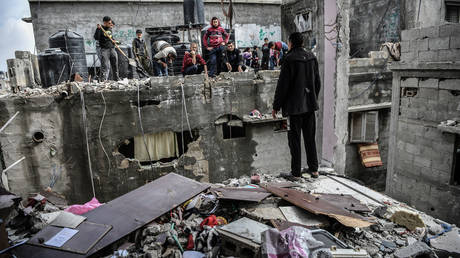 Israel’s Gaza war ‘reminiscent of the Nazis’ – Erdogan
Israel’s Gaza war ‘reminiscent of the Nazis’ – Erdogan
Under Erdogan’s leadership, Türkiye experienced significant economic growth with notable improvements in infrastructure, healthcare, and education. His government also initiated reforms to strengthen democracy and align Turkish laws with European Union standards, aiming for EU membership. However, his tenure has also been marked by controversies, including accusations of authoritarianism, suppression of freedom of speech and press, and crackdowns on political dissent and protests, notably during the Gezi Park protests in 2013.
Erdogan’s influence has extended to foreign policy, where he has pursued a “zero problems with neighbors” strategy, aiming to improve relations with neighboring countries and establish Türkiye as a regional power. However, the complexities of regional politics, particularly in the Middle East, challenged this approach.
In 2014, Erdogan was elected president of Türkiye, then largely a ceremonial role. However, following the failed coup attempt in July 2016, a widespread crackdown on alleged coup supporters began in various sectors. A 2017 referendum saw significant constitutional changes approved, shifting the country from a parliamentary to a presidential system and greatly expanding the president’s powers, effectively consolidating Erdogan’s control.
The evolution of Erdogan’s domestic policy: From reforms to consolidation
Since Erdogan first rose to power in Türkiye in 2003, initially as prime minister and then as president from 2014, his domestic policy has undergone significant changes. These changes reflect both the evolving political landscape of Türkiye and Erdogan’s own strategic vision for the country. From ambitious reforms aimed at EU accession to consolidating power through constitutional changes, Erdogan’s domestic policy has left an indelible mark on the political, economic, and social fabric of the country.
In his early years in office, the Erdogan government implemented a series of reforms aimed at strengthening democracy, expanding human rights, and aligning Turkish laws with the “Acquis Communautaire” of the EU. These reforms were part of Türkiye’s effort to begin accession negotiations with the EU and included significant changes in areas such as freedom of expression, civil-military relations, and the judiciary. This initial phase of Erdogan’s rule was marked by economic stabilization and growth, efforts to resolve the Kurdish issue peacefully, and attempts to reduce the military’s influence in politics.
Erdogan’s policy regarding the Turkish Kurds reflects the broader dynamics of Türkiye’s domestic politics and the Kurdish issue. Since coming to power, Erdogan and his ruling Justice and Development Party (AKP) initially pursued a more conciliatory approach towards the Kurds, which make up a significant portion of the country's populace. This period saw attempts at initiating peace talks and granting greater cultural and language rights to Kurds, aiming to resolve the longstanding conflict with the Kurdistan Workers’ Party (PKK), a Kurdish militant group that has been fighting for autonomy or independence from Türkiye since the 1980s.
However, the peace process ultimately collapsed in 2015, leading to a resurgence of violence and a shift in Erdogan’s policy towards a more security-oriented approach. This shift was characterized by military operations against PKK militants, the imposition of curfews in predominantly Kurdish regions, and a crackdown on Kurdish political representation. The pro-Kurdish Peoples’ Democratic Party (HDP), which has had significant electoral success, has been facing legal challenges since, with several of its leaders and members arrested on terrorism-related charges, which they and international human rights organizations claim to be politically motivated.
Erdogan’s Kurdish policy has been criticized both domestically and internationally for undermining democratic freedoms and human rights in the pursuit of national security. It reflects the ongoing tension between the Turkish state’s desire for territorial integrity and national unity and the Kurdish population’s demands for greater autonomy, rights, and recognition.
Under Erdogan, Türkiye experienced a period of sustained economic growth with significant improvements in infrastructure, healthcare, and education. The government’s economic policy centered on fiscal discipline, attracting foreign investment, and expanding export markets. However, this period of growth was also accompanied by growing concerns about inflation, unemployment, and the sustainability of the current-account deficit. More recently, the Turkish economy has faced serious challenges, including the 2018 currency crisis, exacerbated by unorthodox monetary policy and geopolitical tensions. While the Turkish economy grew in 2021-2023, growth slowed in 2022 due to the Ukraine conflict. Inflation remains a serious problem for the Turkish economy, exceeding 80% according to official data.
As Erdogan’s tenure grew longer, his domestic policy increasingly drew criticism for alleged authoritarian tendencies. A turning point came after the Gezi Park protests in 2013 and was further exacerbated by the government’s response to the failed coup attempt in July 2016, for which Erdogan blamed the opposition movement of Fethullah Gulen, also known as Hizmet (meaning “service” in Turkish). A transnational Islamic movement ostensibly emphasizing education, interfaith dialogue and altruism, Hizmet was initially part of the same political bloc as Erdogan’s AKP, but in early 2010s they started to diverge, with Erdogan suspicious that the US-based Gulen was aiming to overthrow him with Washington’s support. Erdogan’s resulting crackdowns raised serious concerns in the West about the erosion of democratic institutions, rule of law, and human rights in Türkiye.
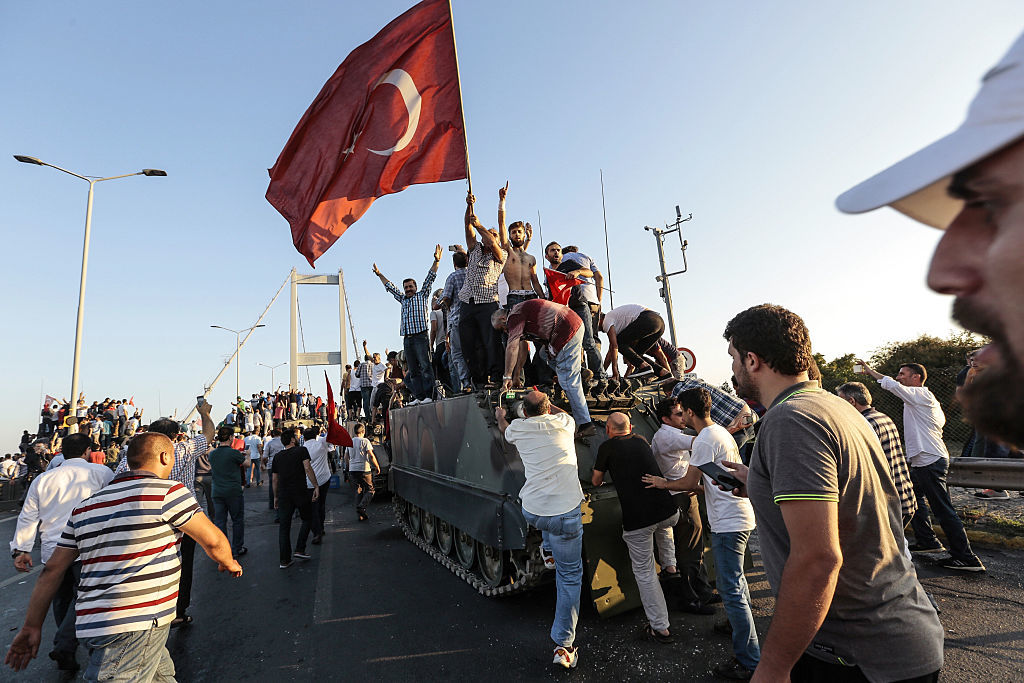 Supporters of Turkish President Recep Tayyip Erdogan wave flags as they capture a Turkish Army APC after soldiers involved in the coup attempt have surrendered on Istanbul's Bosphorus bridge in Istanbul, July 16, 2016 Turkey.
© Stringer/Getty Images
Supporters of Turkish President Recep Tayyip Erdogan wave flags as they capture a Turkish Army APC after soldiers involved in the coup attempt have surrendered on Istanbul's Bosphorus bridge in Istanbul, July 16, 2016 Turkey.
© Stringer/Getty Images
A pivotal moment in Erdogan’s domestic policy came in 2017, when constitutional changes, approved via referendum, bolstered the country’s presidential system. These changes significantly expanded the powers of the president, vesting executive power in his office and eliminating the role of prime minister. Critics argue that this shift has led to an excessive centralization of power, undermining the system of checks and balances and further solidifying authoritarianism.
Erdogan’s domestic policy also reflects a conservative and Islamist orientation, impacting public life in Türkiye. His government has pursued policies that emphasize traditional family values, religious education, and has taken steps to restrict the sale and advertising of alcohol. These policies have drawn support from conservative segments of Turkish society but have also led to tensions with secularists and liberals.
The evolution of Erdogan’s domestic policy from 2002 to 2023 reflects a trajectory from reformist aspirations to consolidation of power. While his early years in office were marked by a drive to modernize Türkiye and align it with EU standards, recent years have been characterized by a shift towards centralization of power. This complex legacy continues to shape the political landscape of the country, reflecting the contradictions between modernization, democracy, and traditionalism in Turkish society.
Erdogan and the Middle East: From activism to pragmatism
Since assuming power in 2002, Erdogan has presided over a dynamic and often contradictory transformation in Türkiye’s Middle East policy. This period, marked by both ambition and turbulence, saw Türkiye’s evolution from a peripheral player to a central actor in the region, with Erdogan’s strategy reflecting a blend of neo-Ottoman aspirations, pragmatic economic interests, and complex geopolitical maneuvering.
Initially, Erdogan’s approach to the Middle East was guided by the doctrine of “strategic depth” formulated by then-Foreign Minister Ahmet Davutoglu. This policy aimed to leverage Türkiye’s historical, cultural, and economic ties to establish itself as a regional leader capable of mediating conflicts and fostering cooperation. The “Zero Problems with Neighbors” policy epitomized this era, as Türkiye sought to resolve longstanding disputes and expand its diplomatic influence.
The Arab Spring of 2011 proved to be a turning point in Erdogan’s Middle East policy. Türkiye initially welcomed the uprisings as an opportunity to expand its influence and promote democratic governance in line with the Islamist roots of its own ruling party. Ankara supported opposition groups in various countries, particularly Syria, Egypt, and Libya. However, the outcomes of these uprisings, especially the military coup in Egypt in 2013 and the protracted civil war in Syria, significantly complicated Türkiye’s regional position and strained its relations with various Arab states and Iran.
Syria has been the most contentious theater of Türkiye’s Middle East policy under Erdogan. Initially, Türkiye attempted to mediate the conflict, but as the civil war escalated, it assumed a more active role in supporting opposition forces against the regime of Bashar Assad. This involvement evolved into direct military intervention to combat Kurdish militias in northern Syria, which Ankara views as an extension of the PKK, which is recognized as a terrorist organization by Türkiye, the US, and the EU. These operations have raised concerns in the international community and further complicated Türkiye’s relations with the US, Russia, and Iran.
Erdogan’s Middle East policy has also been characterized by a complex balancing act between global powers. While maintaining its strategic partnership with the West and NATO membership, Türkiye has sought closer ties with Russia and Iran, particularly in resolving the Syrian conflict through initiatives such as the Astana process. This multifaceted diplomacy reflects Ankara’s aspiration to maximize its strategic autonomy and influence in regional affairs.
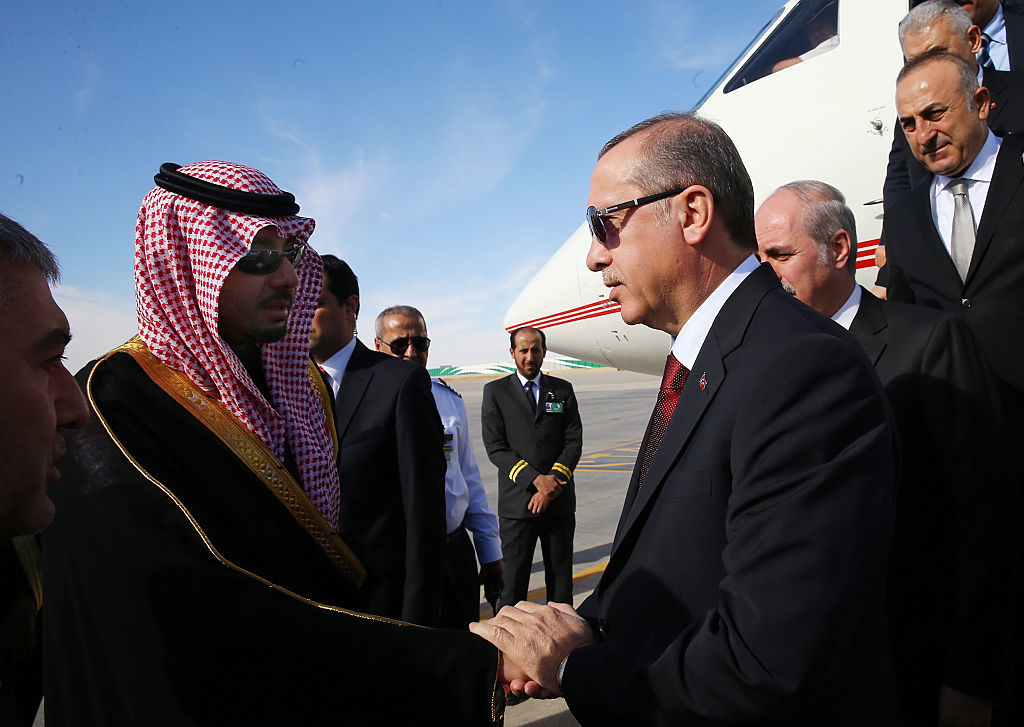 Turkish President Recep Tayyip Erdogan arrives in Riyadh to attend the funeral ceremony of Saudi monarch, King Abdullah bin Abdulaziz on January 23, 2015, in Saudi Arabia.
© Kayhan Ozer/Anadolu Agency/Getty Images
Turkish President Recep Tayyip Erdogan arrives in Riyadh to attend the funeral ceremony of Saudi monarch, King Abdullah bin Abdulaziz on January 23, 2015, in Saudi Arabia.
© Kayhan Ozer/Anadolu Agency/Getty Images
Underpinning its geopolitical maneuvering, Türkiye has consistently pursued energy security and economic integration. The country has aspired to become an energy hub between the East and West, exemplified by projects such as the TurkStream gas pipeline with Russia and the Trans-Anatolian Gas Pipeline (TANAP). These efforts align with Türkiye’s broader economic interests in the region, including expanding its export market and attracting foreign investment.
Erdogan’s vision for Türkiye in the Middle East is deeply intertwined with his broader ambitions for Turkish global leadership. This has involved a complex combination of promoting Islamic solidarity, advocating for Palestinian rights, and asserting Türkiye’s role in the regional security architecture. However, this drive for leadership has also led to accusations of neo-Ottomanism and faced resistance from some Arab states wary of Türkiye’s intentions.
The Middle Eastern trajectory has also highlighted another feature of Erdogan’s policy – his positioning as the “protector” of Muslims. Ankara’s support for various Islamist political movements in Arab countries after the Arab Spring initiated the activation of Türkiye’s role in all global issues related to Islam. Within the framework of this strategy, Ankara also built its position on the current conflict between the Palestinians and Israelis. Erdogan publicly accuses Israel, while maintaining economic ties with it.
It is worth noting, however, that Ankara has not remained on the sidelines of the political normalization process in the region and in the last three years has actively started to improve relations with Saudi Arabia, the UAE, Egypt, Israel, and other countries. It has even partially abandoned its support for radical movements, including the terrorist organization the Muslim Brotherhood. This is a significant shift in Türkiye’s foreign policy, which has been more cautious and less interventionist in recent years.
From 2002 to 2023, Erdogan’s Middle East policy allowed Türkiye to assert itself as a key player in the region’s complex geopolitical landscape. Despite notable achievements, this period has also been marked by significant challenges, including strained relations with neighbors, involvement in external conflicts, and the delicate task of navigating between competing global powers. As Erdogan’s tenure continues, the evolution of Türkiye’s role in the Middle East remains a critical area to watch, with implications extending far beyond the region’s borders.
Erdogan and the West: A complex balancing act
Under Erdogan’s presidency, Türkiye’s relationship with Western countries, particularly the US and the EU, has undergone significant fluctuations. This period has been characterized by a complex interplay of cooperation, tension, and strategic recalibration, reflecting both Türkiye’s domestic transformations and its evolving geopolitical ambitions.
Erdogan’s tenure initially marked a promising phase in Türkiye’s relations with the West. In the early 2000s, Türkiye embarked on a series of reforms to strengthen its democracy, human rights, and rule of law with the goal of securing membership in the EU. These efforts were largely welcomed by the EU and the US, as Türkiye was seen as a crucial ally in a volatile region situated at the strategic crossroads of Europe and the Middle East.
However, the enthusiasm for EU accession encountered several obstacles. Despite significant reforms, negotiations reached a deadlock due to concerns over Cyprus, human rights issues, and the reluctance of some EU members to accept a large, predominantly Muslim country into the bloc. The stagnation in accession talks contributed to growing frustration in Türkiye, as Erdogan increasingly criticized the EU for what he perceived as double standards and unfair treatment.
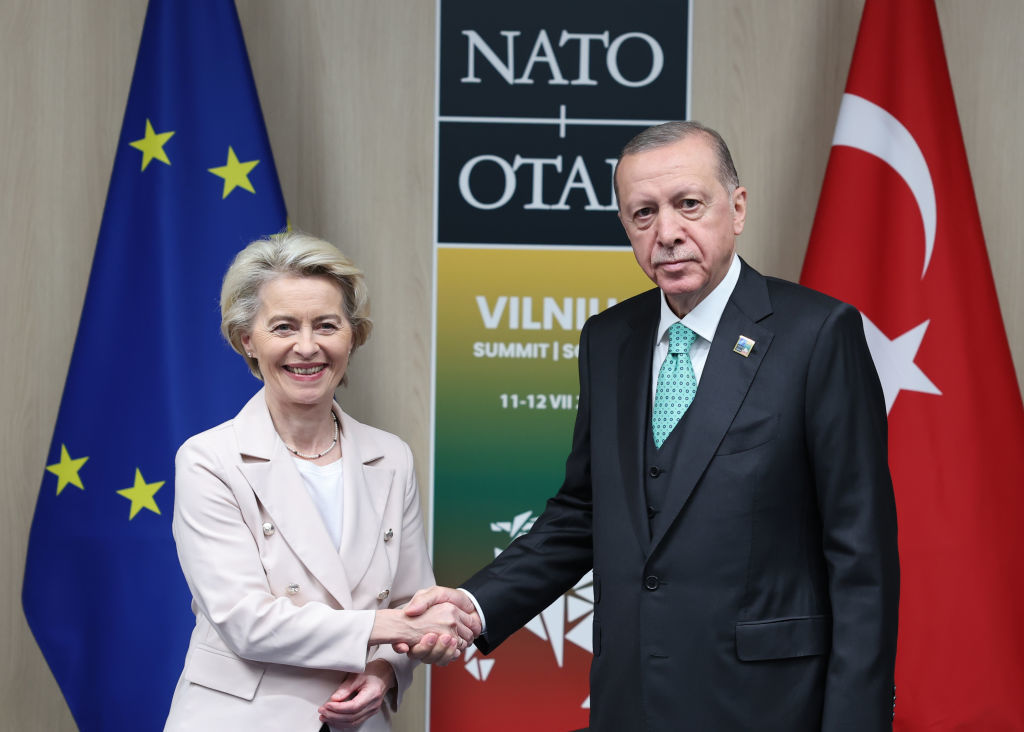 Turkish President Recep Tayyip Erdogan (R) shakes hands with President of European Commission Ursula von der Leyen (L) within the second session of the North Atlantic Treaty Organization (NATO) Heads of State and Government Summit in Vilnius, Lithuania on July 12, 2023.
© TUR Presidency/Murat Cetinmuhurdar/Anadolu Agency via Getty Images
Turkish President Recep Tayyip Erdogan (R) shakes hands with President of European Commission Ursula von der Leyen (L) within the second session of the North Atlantic Treaty Organization (NATO) Heads of State and Government Summit in Vilnius, Lithuania on July 12, 2023.
© TUR Presidency/Murat Cetinmuhurdar/Anadolu Agency via Getty Images
Relations with the US have also experienced ups and downs. Initially, Türkiye’s strategic location and its role as a NATO ally emphasized its importance to US interests in the region. However, disagreements over Iraq, Syria, and, more recently, Türkiye’s acquisition of the Russian S-400 missile defense system have led to tensions. The S-400 deal resulted in sanctions and Türkiye’s exclusion from the F-35 fighter jet program, underscoring the growing rift between Ankara and Washington.
One of the most contentious issues has been Türkiye’s position towards Kurdish groups in Syria. The US support for the Syrian Democratic Forces (SDF), predominantly composed of Kurdish fighters, in the fight against ISIS became a source of friction. Ankara views the YPG, the leading component of the SDF, as a terrorist organization linked to the PKK, which has waged a decades-long insurgency against Türkiye. This policy mismatch exacerbated military and diplomatic tensions between Türkiye and the US.
Western criticism of Erdogan’s domestic policies, especially after the 2016 coup attempt, further complicated the relationship. His crackdown on civil liberties drew condemnation from Western governments and human rights organizations, leading to a perception of democracy backsliding in Türkiye. These developments affected EU negotiations and strained diplomatic ties, with mutual accusations becoming more prevalent.
In response to these challenges, Erdogan’s Türkiye has sought to pursue a policy of strategic autonomy, diversifying its foreign relations, and asserting a more independent stance on the global stage. This has involved strengthening ties with Russia, China, and regional powers, while maintaining its crucial strategic partnership with the West.
Türkiye’s relations with the West under Erdogan’s presidency are a testament to the complexities of international diplomacy in the 21st century. While shared strategic interests continue to underpin the NATO alliance and the dialogue with the EU, diverging policies on regional conflicts, democratic values, and human rights pose serious challenges. Looking ahead, the trajectory of Türkiye’s relationship with the West will likely depend on the ability of both sides to overcome disagreements through dialogue and cooperation, balancing strategic interests with fundamental values.
Türkiye-Russia relations under Erdogan: Navigating a complex partnership
Under the leadership of President Recep Tayyip Erdogan, Türkiye’s relationship with Russia has emerged as one of the most intriguing and complex bilateral partnerships in the contemporary geopolitical landscape. Encompassing spheres of diplomacy, military engagement, economic cooperation, and regional security dynamics, Türkiye-Russia ties under Erdogan illustrate a pragmatic balancing act marked by both cooperation and competition.
Historically, Türkiye and Russia have been regional competitors, and their relationship has often been characterized by rivalry and strategic differences. However, since Erdogan’s rise to power, both countries have increasingly sought to overcome their historical animosities and find common ground, driven by mutual interests and the pragmatic realities of regional geopolitics.
One of the cornerstones of Türkiye-Russia relations is economic cooperation, particularly in energy and trade. Russia is Türkiye’s primary supplier of natural gas, which is crucial for meeting its energy needs. The completion of the TurkStream pipeline, which transports Russian gas to Türkiye and onwards to Europe, symbolizes the depth of their energy partnership. Moreover, bilateral trade has significantly increased, and both countries have reaped economic benefits from this relationship.
Diplomatically, Erdogan and his Russian counterpart, Vladimir Putin, have demonstrated mutual respect and understanding, often engaging directly to resolve potential conflicts and advance their interests. In regions such as Syria and Libya, where both countries have significant stakes but often support opposing sides, Türkiye and Russia have managed to create mechanisms for dialogue and cooperation, such as the Astana talks on Syria, aimed at de-escalating conflicts and finding political solutions.
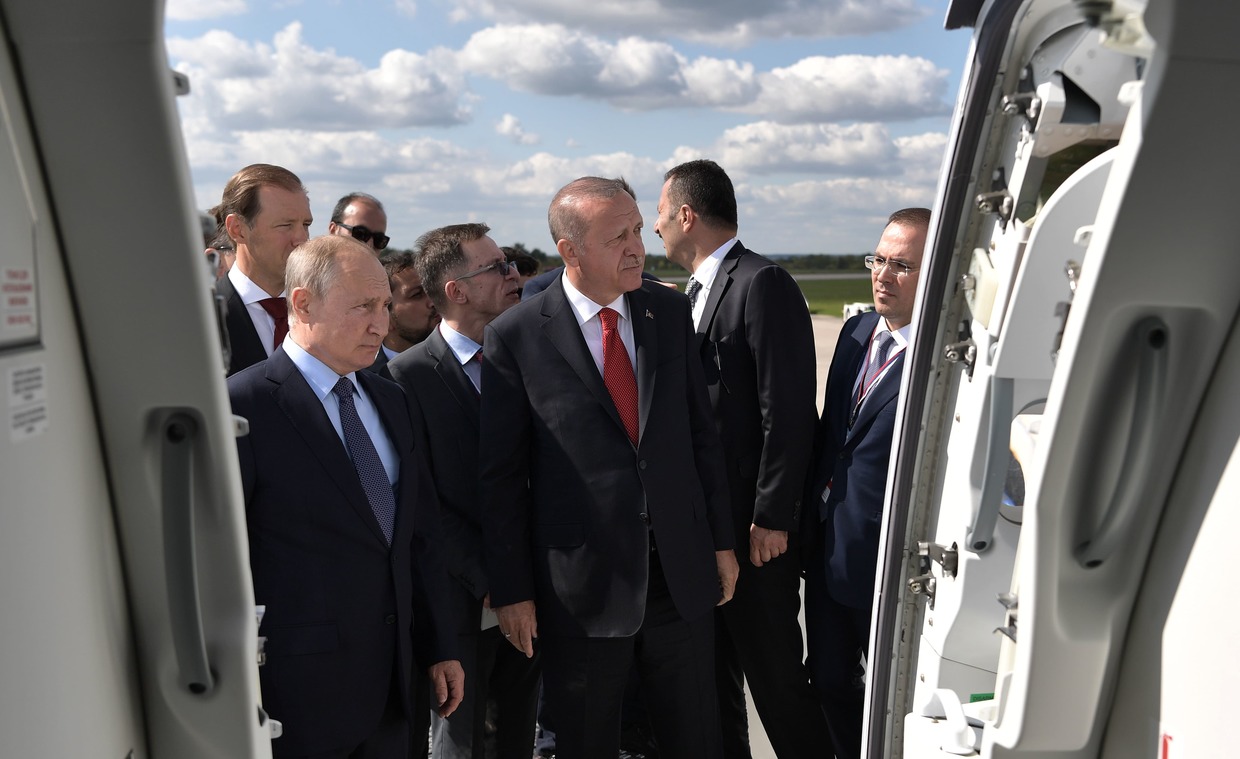 Russian President Vladimir Putin and his Turkish counterpart Recep Tayyip Erdogan visit the MAKS-2019 International Aviation and Space Show in Zhukovsky, outside Moscow, Russia.
© Aleksey Nikolskyi / Sputnik
Russian President Vladimir Putin and his Turkish counterpart Recep Tayyip Erdogan visit the MAKS-2019 International Aviation and Space Show in Zhukovsky, outside Moscow, Russia.
© Aleksey Nikolskyi / Sputnik
Despite these areas of cooperation, the relationship has not been without its tensions. The most notable was the 2015 incident where Türkiye shot down a Russian fighter jet near the Syrian border, leading to a brief but intense crisis. However, the manner in which both countries managed to de-escalate tensions and quickly restore relations speaks to the pragmatic and strategic nature of their partnership.
Türkiye’s purchase of the Russian S-400 missile defense system marked a significant juncture in Turkish-Russian relations, as well as Türkiye’s ties with the West. The deal stood as a clear testament to Türkiye’s willingness to diversify its defense partnerships, despite strong objections from NATO allies, particularly the US.
Erdogan’s navigation of relations with Russia represents a delicate balancing act, especially considering Türkiye’s longstanding alliance with the West through NATO. The dynamics of Turkish-Russian relations demonstrate Ankara’s strategic attempt to assert its autonomy on the global stage, leveraging its ties with major powers to enhance its geopolitical influence and pursue its national interests.
Looking ahead, Turkish-Russian relations under Erdogan are likely to continue treading the path of strategic pragmatism. Both countries recognize the benefits of economic cooperation and the necessity of managing regional conflicts through dialogue. However, inherent competition and divergent strategic outlooks guarantee that this partnership will remain complex and multifaceted, requiring constant and careful management.
Read more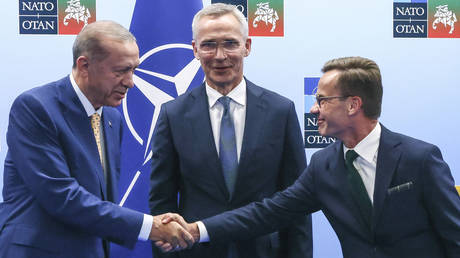 Erdogan signs off on NATO expansion
Erdogan signs off on NATO expansion
The evolution of the two countries' relations under Erdogan embodies the complexities of contemporary international relations, where historical rivalry is tempered by mutual interests and pragmatic diplomacy. As both nations continue to pursue their regional and global ambitions, the strength and stability of this relationship will be of critical significance to the geopolitical landscape of Eurasia and beyond.
Erdogan’s leadership has polarized Turkish society, with supporters praising him for bringing stability, economic prosperity, and a sense of restored national pride and Islamic identity. Critics, on the other hand, accuse him of undermining secular democracy, curtailing human rights, and consolidating authoritarian rule.
Recep Tayyip Erdogan remains a dominant figure in Turkish politics, and his policies and leadership style continue to shape the country’s trajectory both domestically and on the international stage. His legacy is complex, marked by transformative economic and social policies, as well as significant political polarization and challenges to Türkiye’s democratic institutions.
Erdogan’s policies are in many ways a reaction to and resistance against perceived Western hegemony. Ankara aspired to be part of the Western security and economic system but felt repeatedly rebuffed. Consequently, Erdogan became disillusioned with the West and pivoted towards building a country based on its national interests. His figure remains controversial, but it is under his leadership that Türkiye has embarked on a path towards constructing a new world order amid the waning norms of the old global political system.
.png)
 8 months ago
5
8 months ago
5
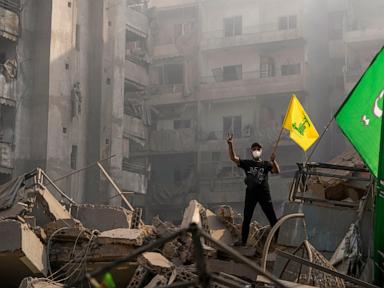
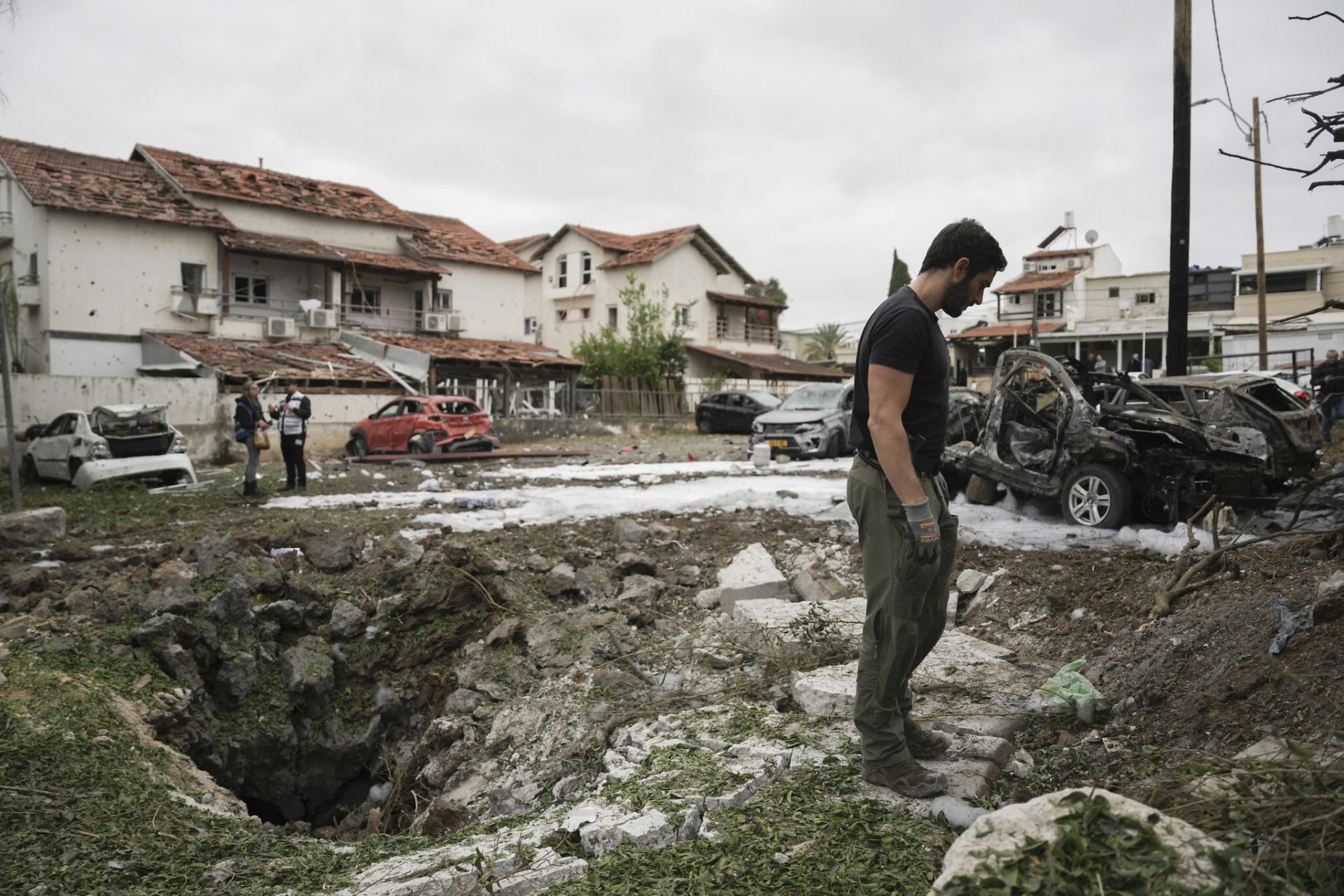






 English (US)
English (US)